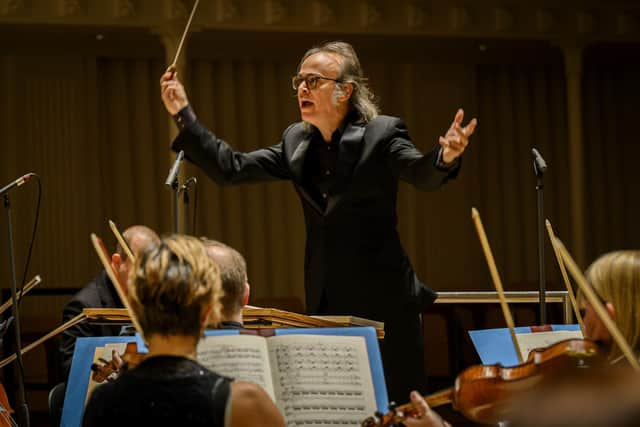Music review: BBC SSO & Ilan Volkov, City Halls, Glasgow
BBC SSO, City Halls, Glasgow *****
It was typically brave of conductor Ilan Volkov to offer a BBC SSO programme of 20th century radicalism the week before Christmas and somehow sprinkle its experimentalism with seasonal cheer.
Take Xenakis’ Atrées, played by a tight-knit ensemble of only ten musicians, in which melody is supplanted by a kaleidoscope of sonic sensations, mathematically conceived, yet somehow triggering a sequence of unending fascination. Superbly committed playing by the musicians gave it the excitement of a mini-drama, its characters fitfully interactive yet combining to form a pungent, metamorphosing organism.
Advertisement
Hide AdAdvertisement
Hide Ad

Debussy’s ballet Jeux had its own story to tell, his 1913 Diaghilev commission – he termed it a “poème dansé – oddly mysterious and riotously playful in its allusions to the sport of tennis as a metaphor for a love triangle. In this concert performance, the focus was naturally on the orchestra, now bulked up to wondrous excess, and the unending stream of inventiveness that Debussy employs, from the dense opening veil of mystery and capricious scherzando to surge upon surge of luscious, teasing passion.
The concert’s second half reflected the first, to the extent that Ligeti’s brief, small-scale Ramifications for strings – a beguiling sound world in which whispered, pent-up clouds of micropolyphony shift magically in and out of sync – was followed by larger SSO forces in Bartók’s 1930s Music for Strings, Percussion and Celeste.
Volkov addressed the Bartók with lip-smacking precision, its confidence wavering only once or twice, allowing the needle-sharp intricacy of its innards to propel an unstoppable flow. After the subdued keening of the opening, its introspective motifs wonderfully suffocating, and the ironic whimsy and darker shadows of the contrasting central movements, the final Allegro was sensational. Its gyrating exuberance, driven by Bulgarian-fuelled rusticism, drew ecstatic cheers from a hyped-up audience. Fully deserved.